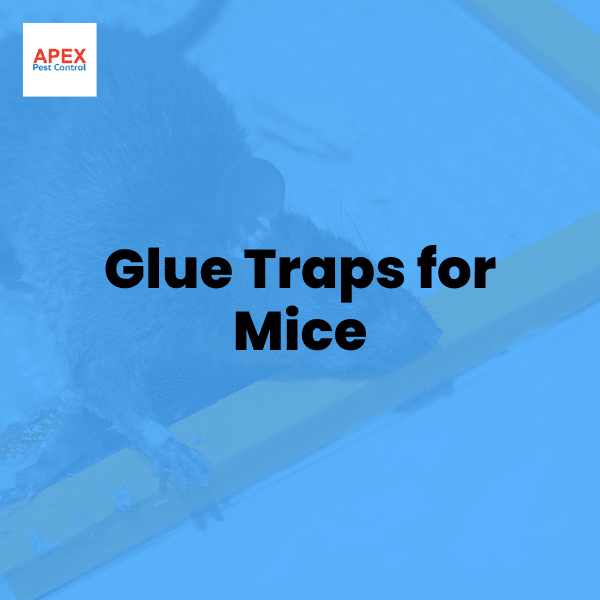Glue Traps for Mice: Effective Rodent Control or Ethical Dilemma?
Are you struggling with a mouse infestation in your home or business? Glue traps have been a common DIY solution in pest management in the past, but are they truly effective and humane? Let’s explore the pros and cons of using glue traps for mice control and consider some better alternatives.
Learn the essentials of Electronic Mouse Traps with our detailed guide, offering practical insights and tips for effective rodent control.
Firstly, An Important Note on Glue Traps in the UK
The Glue Traps (Offences) Act 2022
Professional Pest Controllers
Licensing Requirements
Other UK Nations
What Are Glue Traps?
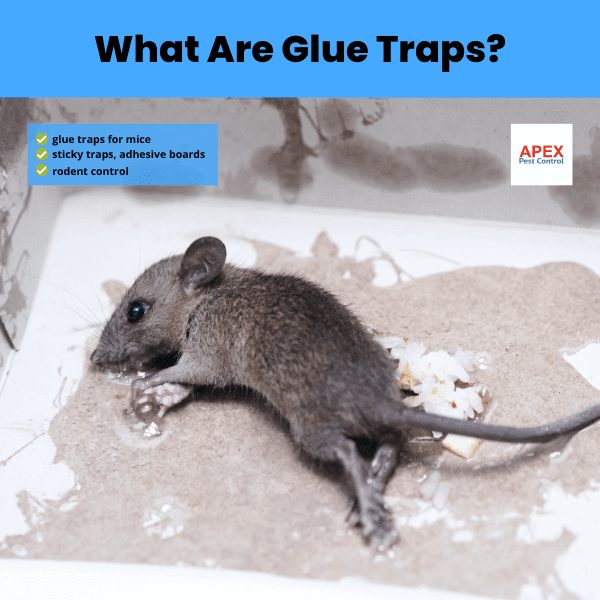
Glue traps, also known as sticky traps or adhesive boards, are a form of pest control that works by trapping unwanted creatures on a surface coated with an extremely strong adhesive. These devices come in various shapes and sizes to target different pests, including insects, spiders, and rodents such as mice and rats.
How Glue Traps Work?
The operation principle behind glue traps is simple yet effective. The lure—be it food bait or a pheromone attractant—draws the pest onto the trap’s surface where they become stuck upon contact with the powerful glue.
Unable to escape from this predicament due to their struggle merely making them stickier, these pests eventually succumb either due to exhaustion or dehydration.
Types of Glue Traps
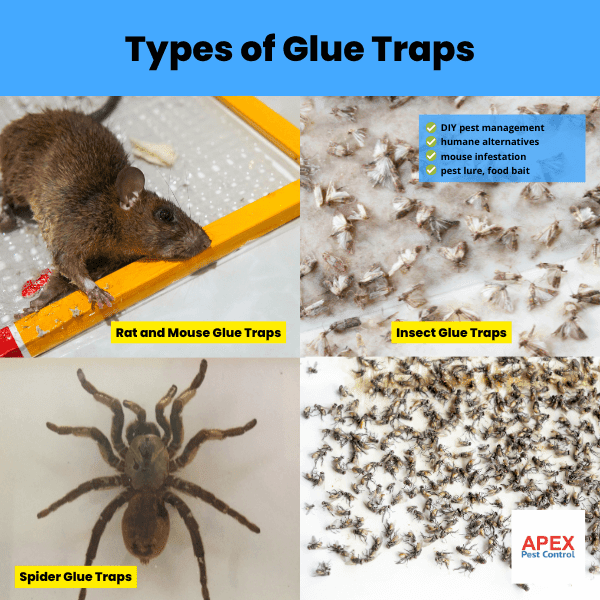
- Rat and Mouse Glue Traps: Larger-sized traps specifically designed for catching small rodents like mice and rats.
- Insect Glue Traps: Cater mainly towards flying insects such as flies or mosquitoes but can also prove effective against crawling ones like cockroaches.
- Spider Glue Traps: Specialises in trapping spiders though it might catch other crawling bugs too.
Pros of Using Glue Traps
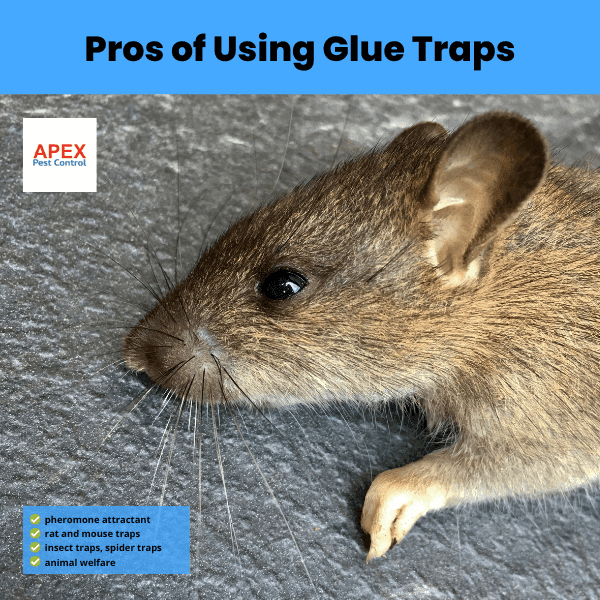
- Easy to Use: They don’t require any complex setup procedure; you simply need to peel off their protective layer then place them strategically wherever you suspect pest activities.
- Non-Toxic: Unlike poison baits which may pose harm if accidentally ingested by pets or kids at home, glue traps use a non-toxic adhesive.
- Cost-Effective: Glue traps are relatively cheaper than other pest control methods like hiring professional exterminators or investing in high-tech electronic devices.
- Part of Integrated Pest Management (IPM): Can be used as part of a comprehensive rodent control strategy if other options are not viable.
Cons of Using Glue Traps
- Inhumane to Animals: Critics argue that glue traps are cruel because trapped animals can suffer a slow and painful death due to stress, starvation, or self-inflicted injuries as they try to break free.
- Non-Selective: These devices will trap any creature small enough to walk across them—including beneficial insects or even small pets if not careful.
- Limited Effectiveness: They only catch individual pests who happen upon the trap but don’t address underlying issues such as nests or breeding grounds which may still exist elsewhere within your property.
- Environmental Impact: Discarded glue traps can contribute towards waste pollution as their synthetic materials are not biodegradable.
Proper Use and Placement of Glue Traps
If you choose to use glue traps, place them along walls, behind furniture, under sinks, or inside cabinets where mice frequently travel. Always handle these devices carefully to avoid getting stuck yourself. Wear gloves if necessary and keep them out of the reach of children and pets.
Alternatives to Glue Traps
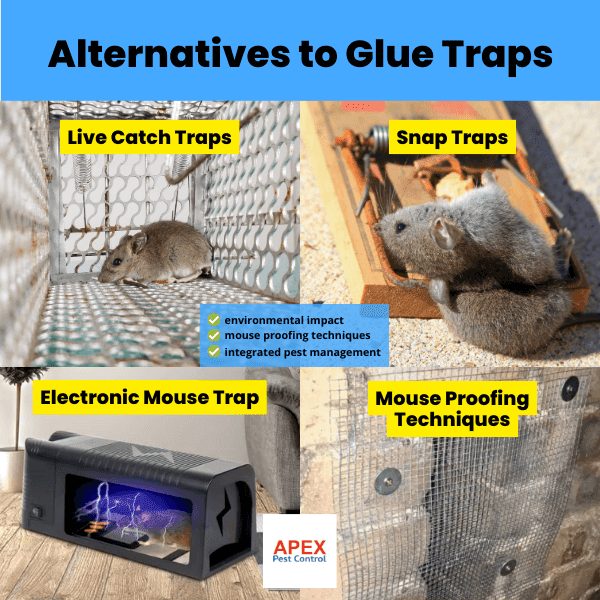
- Snap Traps: Work mechanically where bait lures rodent onto pressure-sensitive plate triggering a spring-loaded bar designed to swiftly kill its prey instantly thus eliminating the suffering associated with traditional adhesive counterparts.
- Live Catch Traps: These humane options allow you to capture pests alive then release them back into the wild far away from your home so they won’t bother you again.
- Electronic Traps: Provide a clean and quick solution, delivering a lethal electric shock to the pest upon entry, killing it instantly.
- Mouse Proofing Techniques: Effective preventive measures that seal entry points and improve sanitation practices.
Comparison of Mouse Trap Types
| Trap Type | Avg. Cost (£) | Reusable | Humane Kill | Safety | Effectiveness |
|---|---|---|---|---|---|
| Glue | £5-£10 | No | Low | Moderate | 50-60% |
| Snap | £1-£5 | Sometimes | Moderate | Low | 60-70% |
| Electronic | £30-£80 | Yes | High | High | 90-100% |
| Live Catch | £10-£30 | Yes | N/A | High | 70-80% |
Ethical Considerations When Using Glue Traps

Animal Rights Concerns
Many animal rights groups vehemently oppose the use of glue traps because of the prolonged suffering they cause to trapped creatures who could remain stuck for days until eventual death by dehydration or starvation.
Environmental Impact
Discarded glue traps can contribute towards waste pollution as their synthetic materials are not biodegradable plus the possibility that non-targeted animals like birds might get entangled leading to further wildlife casualties.
When to Call a Professional
If you’re dealing with a persistent mouse problem, it may be time to call in the experts. Professional pest control services can provide a comprehensive approach to pest exclusion and management, addressing both immediate infestations and long-term prevention.
At Apex Pest Control, we offer humane and effective rodent control solutions tailored to your specific needs. Our professionally trained technicians use the latest methods to ensure your home or business stays pest-free. With over 35 years of experience serving Yorkshire, we’re the trusted choice for pest management.
Conclusion
While glue traps may seem like a quick fix for mouse problems, they come with significant drawbacks in terms of effectiveness and animal welfare. For a more humane and long-lasting solution, consider alternative methods or professional pest control services.
Remember, prevention is key in pest control. Improve your home’s sanitation practices, ensure proper food storage, seal entry points, and maintain cleanliness to discourage rodents from entering your property. Consider the environmental impact of your chosen pest control method.
If you’re struggling with a mouse infestation, don’t hesitate to contact Apex Pest Control. We’re here to help you reclaim your space from unwanted guests using methods that are both effective and considerate of animal welfare.
Call us today on 0114 3491098 for a free quote and expert advice on managing your pest problems.
Frequently Asked Questions
Are glue traps legal in the UK?
Yes, As of 2022, England has banned the use of glue traps for rodents under The Glue Traps (Offences) Act 2022 except by licensed professionals. Always check local regulations before using any pest control method.
How long does it take for a mouse to die in a glue trap?
A mouse can suffer on a glue trap for 3 to 24 hours or even longer before dying from dehydration, starvation, or exhaustion.
What should I do if my pet gets stuck in a glue trap?
If a pet becomes stuck, apply vegetable oil or baby oil to the affected area to dissolve the adhesive. Seek veterinary care if needed.
How effective are glue traps compared to other methods?
While glue traps can catch mice, they’re generally less effective than snap traps. Professional pest control methods often yield the best results.
What’s the most humane way to deal with a mouse infestation?
The most humane approach involves prevention (sealing entry points, proper food storage) combined with quick-kill traps or catch-and-release methods when necessary. Professional pest control services can provide humane and effective solutions.
Are glue traps effective in outdoor settings?
Glue traps can be used outdoors but their effectiveness may be reduced due to rain, humidity, and increased chances of catching non-target creatures. They’re best used indoors where you have control over the environment and specific target pests.
How do I dispose of a used glue trap?
Once an animal has been caught, immediately dispose of the used glue trap inside a sealed bag and throw it away properly. Do not attempt to remove the dead creature yourself as some pests carry diseases that could potentially infect humans upon contact.
Can glue traps be part of an Integrated Pest Management (IPM) approach?
While glue traps can be part of an IPM strategy, many professionals prefer alternative methods due to ethical concerns and limited effectiveness of glue traps. A comprehensive IPM approach often focuses on prevention, exclusion techniques, and more targeted control methods.
What are the environmental impacts of using glue traps?
Discarded glue traps contribute to waste pollution as their synthetic materials are not biodegradable. There’s also potential for non-targeted animals like birds getting entangled leading further wildlife casualties.
Are there any situations where glue traps might be preferable to other methods?
In some specific scenarios such as monitoring for insect infestations or areas where other trap types are impractical—glue traps might be used; however for rodent control alternative methods are generally recommended due to humane effectiveness concerns.

Tony Johnson, Founder & Lead Technician at Apex Pest Control, is a BPCA and NPTA accredited pest management expert with over 35 years’ hands-on experience. Tony specialises in Integrated Pest Management and ensures all services comply with UK pest legislation, including the Wildlife and Countryside Act 1981 and COSHH Regulations 2002. His commitment to continual learning and adapting to industry best practices means clients receive effective, safe solutions for pests affecting homes and businesses across South Yorkshire. Tony’s dedication to professional standards, ethical treatment methods, and local expertise has made him a trusted partner for pest control and prevention.
-
BPCA & NPTA accredited | CHAS certified
-
Committed to UK pest law compliance & safety
-
Focused on effective, ethical pest management for South Yorkshire

